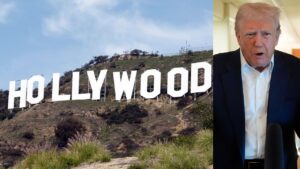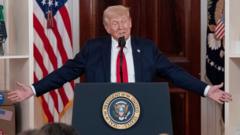In a significant political move, President Joe Biden has prevented Japan's Nippon Steel from acquiring US Steel, fulfilling a commitment to protect the American steel industry amid concerns about national security. The decision follows pressure from the United Steelworkers union and comes as a sensitive issue within the context of the upcoming 2024 presidential election. Biden emphasized that US ownership of steel production is vital to maintaining robust supply chains in the country.
**Biden Halts Nippon Steel's Acquisition of US Steel: Implications for US-Japan Relations**

**Biden Halts Nippon Steel's Acquisition of US Steel: Implications for US-Japan Relations**
US President Joe Biden acts decisively to block Japan's Nippon Steel from acquiring US Steel, citing national security concerns, which raises questions regarding foreign investment and bilateral ties with Japan.
Nippon Steel and US Steel responded to the decision by claiming that the deal's review had been influenced for political reasons, hinting at potential legal action. They criticized Biden's decision as detrimental to future foreign investments in the United States. Japanese officials also lamented the outcome, highlighting concerns regarding the impact on economic relations between the two nations.
Biden's rejection of the $14.9 billion acquisition comes a year after Nippon Steel first proposed the deal, which had been seen as a potential lifeline for the struggling US Steel. The company had expressed fears that without the investment from Nippon Steel, it might have to shut down operations. Despite both companies' assurances not to reduce jobs and other concessions offered to gain support, Biden remained opposed, influenced by election dynamics in crucial states like Pennsylvania.
The Committee on Foreign Investment in the United States had yet to reach a consensus on the national security implications of the deal, leaving Biden to make the final call. He underscored that a robust indigenous steel industry is essential for the nation’s infrastructure, economy, and defense capabilities.
While the United Steelworkers union praised Biden's decision as beneficial for American workers and national security, some analysts suggest that this may not be the end of the acquisition attempt. The potential for renegotiation under a future administration, possibly one led by Donald Trump, was discussed, indicating that the situation remains fluid.
Amidst this, White House spokesperson John Kirby asserted that the administration's position regarding the deal was not adversarial towards Japan but focused on prioritizing American interests. However, observers caution that the move could strain US-Japan relations, a point emphasized by experts aware of the implications for bilateral ties, raising the stakes for future foreign investment discussions.
Biden's rejection of the $14.9 billion acquisition comes a year after Nippon Steel first proposed the deal, which had been seen as a potential lifeline for the struggling US Steel. The company had expressed fears that without the investment from Nippon Steel, it might have to shut down operations. Despite both companies' assurances not to reduce jobs and other concessions offered to gain support, Biden remained opposed, influenced by election dynamics in crucial states like Pennsylvania.
The Committee on Foreign Investment in the United States had yet to reach a consensus on the national security implications of the deal, leaving Biden to make the final call. He underscored that a robust indigenous steel industry is essential for the nation’s infrastructure, economy, and defense capabilities.
While the United Steelworkers union praised Biden's decision as beneficial for American workers and national security, some analysts suggest that this may not be the end of the acquisition attempt. The potential for renegotiation under a future administration, possibly one led by Donald Trump, was discussed, indicating that the situation remains fluid.
Amidst this, White House spokesperson John Kirby asserted that the administration's position regarding the deal was not adversarial towards Japan but focused on prioritizing American interests. However, observers caution that the move could strain US-Japan relations, a point emphasized by experts aware of the implications for bilateral ties, raising the stakes for future foreign investment discussions.




















